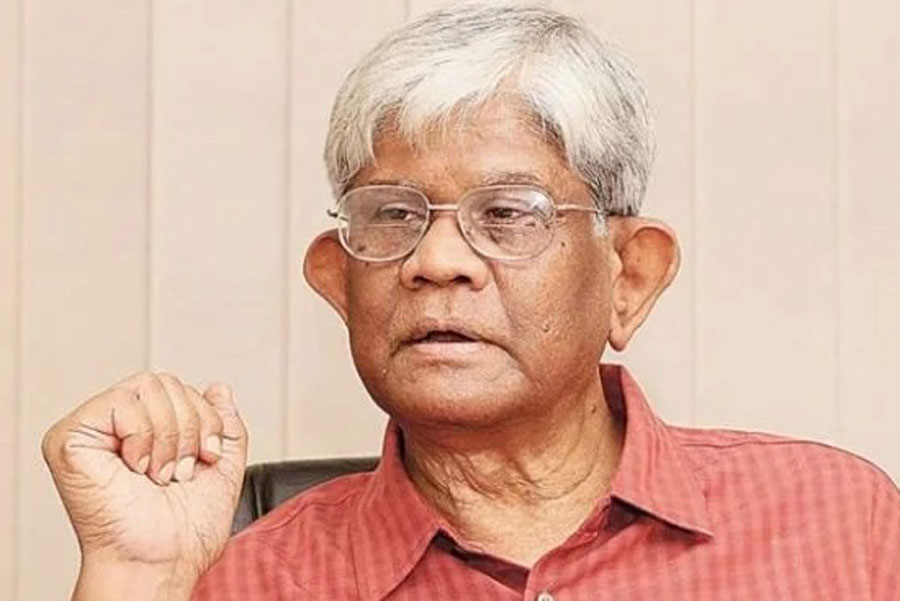
Published :
Updated :

Finance Adviser Dr Salehuddin Ahmed raised questions about reliability of the procedure of measuring poverty by the World Bank, just as the global lender presented Bangladesh situation.
"I know how they measure poverty. There are base…there are clientele (to give interview)," he told newsmen in reply to a query after a meeting of the Advisers' Council Committee on Government Purchase at Bangladesh Secretariat that endorsed rice and wheat imports.
Journalists drew his attention about the World Bank's Tuesday release of development update wherein the Bank showed poverty rate having increased in Bangladesh.
Mr Ahmed said: "You take interview over telephone to 5,000 people and make a statement that poverty has increased. I know these."
He said a man had proposed that the adviser write a paper and he insisted that a firm will give the adviser 20,000 replies within a day for a survey on any issue if the man mediates on this.
"These are matters of reliability," quips the economic pointsman under the current interim government.
However, the finance adviser admits that definitely challenges are there in Bangladesh. "I don't deny that. But this percentage has increased or that percentage has increased..."
Mr Ahmed further says once Nobel-laureate economist Amartya Sen had said: "I don't have to measure extreme poverty. You can recognise a poor person seeing his outlook--by his face, by his behaviour."
To a query on the present economic condition of the country, the finance adviser said he was at a comfort zone on financial aspect, thus feeling quite confident.
His attention was drawn about a survey result on the rate of inflation in Bangladesh where the country's position is worst in South Asia--including Sri Lanka, Pakistan, and even Nepal.
His response: Bangladesh's rate of inflation was very high so despite bringing it down to 8.0 per cent, it does not look attractive.
"Our base was bad. Moreover, it was very difficult for us to bring inflation down, but we still brought it down. That's why we still want to continuously reduce both the food and non-food inflation," he told the reporters.
On his upcoming Washington visit to join the annual meeting of the World Bank and the International Monetary Fund, Mr Ahmed said he would have discussion on ongoing funds in the pipeline and two deals could be signed with the World Bank.
The meeting, chaired by the finance adviser, approved the import of rice from India and wheat from the United States, among other purchase proposals.
Under an approval Indian supplier M/S Bagadiya Brothers Private Ltd will supply 50,000 tonnes of non-aromatic boiled rice to the Directorate-General of Food at a total cost of Tk 2.19 billion-- each tonne costing $359.77.
Moreover, the meeting approved a proposal from the Ministry of Food to import 0.22 million tonnes of wheat from the United States under government-to-government arrangement.
Each tonne of wheat will cost $308 in this procurement where total import cost is fixed at Tk 8.25 billion. Agrocorp International Pte Ltd, a firm authorised by the US Wheat Associates, will supply the grain.
The meeting also approved the import of 30,000 tonnes of bulk granular urea fertiliser from SABIC Agri-nutrients Company, Saudi Arabia, at a total cost of Tk 1.59 billion where each tonne of fertilizer will cost $435.
Bangladesh Agricultural Development Corporation (BADC) has been given the go-ahead to import 120,000 tonnes of DAP fertiliser from Banyan International Trading Limited, China, at a price of Tk 3.76 billion each consignment, 40,000 tonnes of DAP fertiliser from MA'ADEN, Saudi Arabia, at Tk 3.83 billion, and another 40,000 tonnes of MOP fertiliser from Canadian Commercial Corporation (CCC) at a total cost of Tk 1.74 billion.
syful-islam@outlook.com


 For all latest news, follow The Financial Express Google News channel.
For all latest news, follow The Financial Express Google News channel.